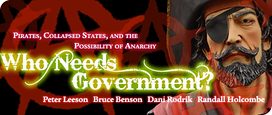Lead Essay
Everybody seems to know we need government … But pirates didn’t! How did they manage without the state? In this issue’s thought-provoking lead essay, Peter T. Leeson, the BB&T Professor for the Study of Capitalism at George Mason University, explores what pirate “constitutions,” credit institutions among 19th century African bandit traders, and the well-being of Somalians after the collapse of the Somalian state have to tell us about the possibility of practical anarchy. It works better than you think, Leeson concludes. “As long as there are unrealized gains to realize, people will find ways to realize them” — state or no state.
Response Essays
Bruce L. Benson, author of The Enterprise of Law: Justice Without the State, argues Peter Leeson’s defense of anarchy is too moderate. Governments in developed nations, Benson maintains, are not better than ordered anarchy. Drawing on Franz Oppenheimer’s classic account of the state as a protection racket, Benson argues that the state only seems necessary because it offers “solutions” to problems the state itself creates. Benson claims that even well-constrained states are essentially parasitic, leading him to conclude that “even when a relatively ‘good’ government exists, there still is way too much government and not nearly enough anarchy.”
Harvard economist Dani Rodrik is willing to accept a number of steps in Peter Leeson’s argument for anarchy, “but [Leeson’s] bottom line … represents a huge leap of faith.” Citing the work of several important thinkers, Rodrik argues that “the problem with self-enforcing agreements is that they do not scale up.” Both theory and data show that complex, well-functioning social and economic systems require the enforcement of rules by government. “Those societies in which markets work best are the ones where the reach of the state is longer, not shorter.”
Florida State University economist Randall Holcombe argues that even if Leeson is right about anarchy, it doesn’t much matter. “Regardless of its merits,” Holcombe writes, “anarchy has no prospect as an actual policy option.” The bottom line is that government is popular in developed nations. Furthermore, anarchy may not be a “stable equilibrium,” in which case it might “coalesce into governments … potentially more oppressive and more destructive than those we see in prosperous areas today.” According to Holcombe, if we’re going to get a government anyway, the best approach to policy is to “make it smaller, less intrusive, and more libertarian,” not to make it go away.

